A no-make-up selfie as she woke up, a snap before her therapy session, a picture with hair removal cream. When Stina Sanders took part in a social media experiment, where she posted “honest” pictures on her Instagram account, she said her followers initially dropped by a few thousand – but the engagement increased.
It was a risky decision for the 25-year-old model and blogger to share those “real” moments in her life, particularly in an online world where there’s so much emphasis on impeccable looks and feel-good photos.
But those real moments resonated with many who feel the pressure from society to always be perfect. After her story went viral, her followers shot up.
Growing up in the modelling industry, she knew how fake it could be, with photographs enhanced through lighting and airbrushing technology. Yet the perception of a model’s life is often judged by their flawless looks.





